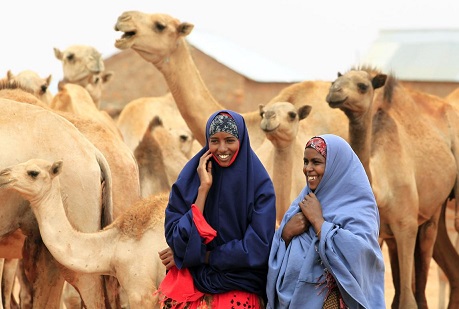
info.afrindex.com
China-Africa Trade Information Service

info.afrindex.com
China-Africa Trade Information Service

Image from qz.com
There are more than 12.2 million camels in East Africa. Camels raised in Somalia account for one-third of the total number of camels in the world and are the country with the largest number of camels.
Camel milk is relatively unfamiliar to many people, but in many countries it has been regarded as an irreplaceable nutrient. In Africa, people with weak health are often advised to drink camel milk. It is favored all over the world because it is rich in iron, vitamins B and C, low in fat. The Food and Agriculture Organization of the United Nations is promoting the sale of camel milk in Western countries, as camel milk is one of the sources of income for poor residents in the desert.
As such, camel dairy products ranging from baby milk to chocolate bars, pizzas to frappuccinos have been launched all across the world. In Chad, milk bars are helping popularize the consumption of the slightly salty milk, while Egypt's Tayyiba Farms offers a range of products including camel white cheese, kefir, and yogurt.
Yet across East Africa, the camel dairy business remains rudimentary with much of it being sold and consumed in domestic markets or guzzled by young camels themselves. This underutilization of the creamy liquid, some say, undermines its potential to grow into a multi-billion-dollar business that could change the lives of herders and milk traders alike. Given its benefits for health and well-being, camel milk could grow to become the next global superfood attracting health-conscious consumers.
Bashir Warsame, whose camel processing firm Nuug opened in Nairobi last year. Warsame sources from herders in the southern and central towns of Voi and Isiolo respectively, delivering both camel milk and yogurt in various flavors to supermarkets and homes in the Kenyan capital. Using a blend of direct marketing, social media, and word of mouth, their aim is to bring the desert animal into cities and realize the commercial value of camels. They are also changing the consumption of camel milk from its usual smoked and boiled usage and introducing it in pasteurized and powdered forms.
These include companies like White Gold, which kickstarted operations in the central town of Nanyuki after the giant camel milk firm Vital faced financial woes and ceased operations in 2017. In Wajir, non-governmental organizations like Mercy Corps have also helped install refrigerated ATMs, allowing traders to keep the milk from going sour and deliver it fresh. To boost the camel population and enhance food security, Kenyan officials have also distributed camels to pastoralists in arid and semi-arid areas.
In Somalia, which has one of the highest numbers of camels worldwide, camel dairy production is also being looked into as a profitable business that can integrate pastoralists into the formal economy.
From Ethiopia's teff to Senegal's fonio, the baobab, tamarind, and dried hibiscus, Africa has contributed to the global explosion of superfoods which have drawn many Western customers due to their high content of nutrients and antioxidants.